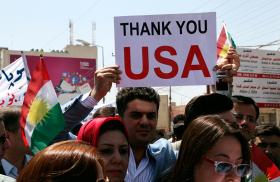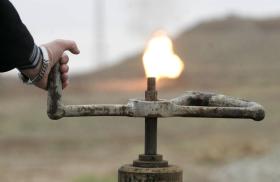
- Policy Analysis
- PolicyWatch 3618
The KRG Turns Thirty: The Future of U.S.-Kurdish Relations in Iraq (Part 2)

Part of a series: The KRG Turns Thirty
or see Part 1: The KRG Turns Thirty: The Future of U.S.-Kurdish Relations in Iraq (Part 3)
In the second of three discussions marking the thirty-year anniversary of the KRG, experts spotlight the impressive U.S.-Kurdish legacy along with current challenges facing the partnership.
Watch video footage of Part 1 of the series.
On June 6, The Washington Institute held a virtual Policy Forum with Jennifer Gavito, Qubad Talabani, and Bilal Wahab. Gavito is the U.S. deputy assistant secretary of state for Iran and Iraq. Talabani is the current deputy prime minister of the Kurdistan Regional Government and former KRG representative in Washington. Wahab is the Institute’s Wagner Fellow and founder of the Center for Development and Natural Resources at the American University of Iraq–Sulaimani. The following is a rapporteur’s summary of their remarks.
Jennifer Gavito
For the last thirty years, the U.S. role in creating and nurturing its relationship with the KRG has proven the effectiveness of a coalition designed to address common threats. Therefore, the relationship is not tactical but strategic, and it has matured into a balanced partnership over time. The relationship has seen mutual cooperation on regional challenges such as counterterrorism and fighting the Islamic State, economic development, cultural heritage issues, and human rights. During this time, the United States has invested billions of dollars in Iraqi Kurdistan. To highlight its commitment, Washington announced in 2017 that it would build America’s largest consulate worldwide in Erbil. The U.S.-KRG shared values of democracy and human rights are key to the strategic relationship. Given the importance of these values in improving democratic governance, the United States views Iraqi Kurdistan as essential to the wider stability of Iraq. U.S. bipartisan support demonstrates a long-running commitment to Kurdistan and its role in Iraqi politics, and bodes well for the future of this multifaceted relationship.
Nevertheless, U.S. concerns have arisen regarding democratic backsliding and eroding civil liberties in Kurdistan. Furthermore, divisions between the Kurdistan Democratic Party and the Patriotic Union of Kurdistan have been exploited by Iran and have further delayed the formation of an Iraqi government. Another area of concern involves the Sinjar agreement focused on security in the area, which dates to October 2020 and has yet to be implemented.
Today, the KRG faces direct ballistic missile attacks from Iran and drone and rocket attacks from Iran’s affiliated militias. Despite growing concerns about U.S. retrenchment in the Middle East, Washington is indeed fully committed to its relationship with Erbil and is willing to provide an alternative path to that offered by Iran. The United States continues to invest heavily in Iraqi Kurdistan’s education, telecommunications, and energy sectors, and additionally is pushing the KRG both privately and publicly to institute necessary reforms that preserve civil liberties and human rights. The United States recognizes that work remains to be done but is committed to a lasting strategic partnership with Iraqi Kurdistan.
Qubad Talabani
Self-governance for Iraqi Kurdistan and associated national aspirations emerged as a result of the U.S.-led coalition’s Operation Provide Comfort in 1991. What started as a humanitarian effort—the establishment of a safe haven for Iraqi Kurds—evolved into a political relationship and mutual trust that has paid dividends. U.S. bipartisan support has carried immense benefits for the KRG, which served as an important partner during the 2003 U.S. invasion of Saddam Hussein’s Iraq. Moreover, the clearance of many hurdles by the U.S.-KRG relationship, from humanitarian challenges to nation building, testifies to its durability and value. During the 2005–12 period especially, this mutually beneficial partnership flourished, with the Kurds setting themselves apart from the rest of the country. The consulate in Erbil is a reminder of the U.S. commitment and investment in the region, which in turn builds trust in the relationship. Other related positive trends include further U.S. investment in technical assistance and business practices.
In terms of reform, the KRG, like the U.S. government, is concerned about democratic backsliding and a diminishment of civil liberties. Therefore, the vision for and enactment of reforms are needed, as well as transparency in politics and the economy. Such reforms require technical expertise and financial commitments. Reforms on the political level could take the shape of legal refinements such as training judges and maintaining political independence, reconciling political parties so that government authority transcends that of political party, and reform within political parties themselves. The KRG takes ownership of these values and the need for reform but welcomes U.S. nudges and support.
Bilal Wahab
Since the early 1990s, the United States has viewed Iraqi Kurdistan as a stable partner in an unstable region. Begun as a humanitarian relief effort during Operation Provide Comfort, the U.S.-Kurdistan relationship has evolved into a linchpin of U.S. strategy in Iraq and the broader region over the last thirty years. The Kurds built their reputation as a credible partner through their opposition to the regime of Saddam Hussein during the 1990s and their stability and counterterrorism efforts in Iraq after the U.S. invasion in 2003. This process allowed the American exercise in nation building to evolve into a sustained effort, in the area not only of humanitarian protection but also of politics, with a positive impact on both the Americans and the Kurds.
As the United States and Iraqi Kurdistan look ahead to the next thirty years, however, the perception of an exceptional Kurdistan in Iraq is waning. Accountable governance and freedoms have been eroding, and KRG stability is increasingly challenged by Iran’s direct and indirect attacks. The KRG has yet to reestablish its strong footing since the unsuccessful independence referendum it held in 2017. If it remains a weak and divided partner, the KRG will fall short of furthering U.S. goals for a stable and sovereign Iraq. For its part, the KRG has greater expectations of Washington to maintain support for and protection of a region it helped build. Therefore, the question will now be whether the Kurds can not only survive but also thrive for the next thirty years.
This summary was prepared by May Kadow. The Policy Forum series is made possible through the generosity of the Florence and Robert Kaufman Family.







